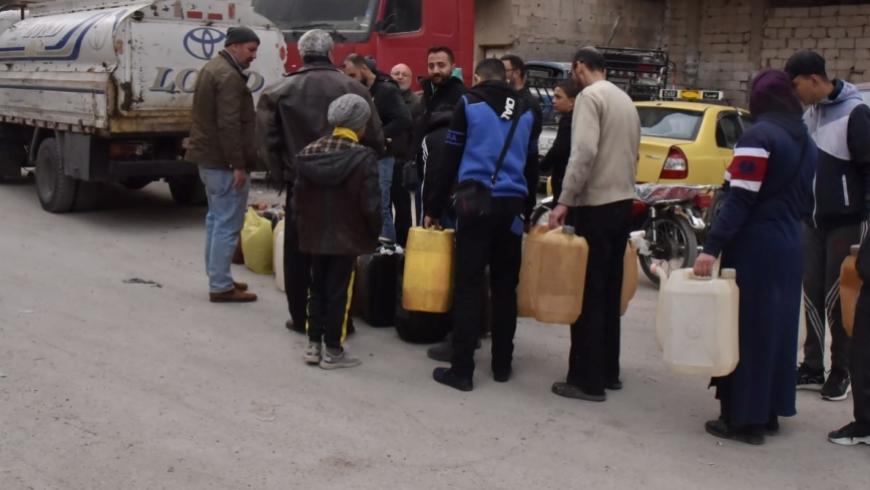The recent decision of the Syrian government to restrict subsidies even further has put the country’s economy in a difficult position. The Syrian pound has accelerated its depreciation, reaching an all-time low of 6,000 pounds for the dollar.
Bakeries operate only 2 hours
Many owners of sweets bakeries and private bakeries in Damascus are forced to close their factories due to the fuel crisis and the rise in fuel prices on the black market. This comes amid an almost complete power outage, which caused large numbers of workers to be laid off.
The newspaper Al-Watan, close to the government, quoted one of the owners of the closed bakeries confirming that he closed his bakery for several reasons, including the exaggerated rise in fuel prices on the black market. He also accused the internal trade and consumer protection patrols of bakery owners of trading in subsidized materials if there are quantities of diesel other than the quantities distributed by a fuel company.
Ambulances Stranded?
Coinciding with the reduction of fuel allocations to 40%, which touched ambulances serving patients, Damascus Health Director Dr. Muhammad Samer Shahrour told the pro-government Athr Press that ambulances work only in critical cases, such as transporting patients of emergency accidents and heart attacks.
The same applies to the Damascus Countryside Health Directorate, where a source told Athr Press that the issue of ambulances is being dealt with in cooperation between the Ministry of Health and the Presidency of the Council of Ministers by exempting the ambulance system from reducing allocations.
PM says lifting subsidies was “difficult”
The pro-government al-Watan reported that Prime Minister Hussein Arnous promised that the situation of oil derivatives would be better in the local markets within a month, admitting that any decision taken by the government to raise the price of any material is a difficult decision, but the sever compulsory conditions forced the government to make them.
The Prime Minister told a press conference that the decision to raise the price of gasoline and diesel materials is not a new economic policy by the government. He promised that his government would not give away the subsidy policy.
Arnous explained that without taking a decision to raise the price of gasoline and diesel fuel, the economic activity and all services provided to citizens would have to stop, “whether for agriculture, industry, transportation or securing hospitals with fuel and all the necessities that life requires by securing these oil derivatives.”
He pointed out that there are two main factors that led to the current situation: the first is the rise in the exchange rate of the dollar that the world is witnessing in general; the second is what is happening all over the world now and the war that is taking place in Ukraine and in all regions that are witnessing a rise in the prices of oil derivatives.
He indicated that as a result of these circumstances have increased the prices of oil derivatives to double what they were in the past.
“We all know that most oil derivatives are imported from abroad, given that what is produced in Syria is very small quantities as a result of the occupation and the exit of oil wells from the control of the state,” he elaborated.
Arnous stated that when the cabinet was discussing raising the prices of oil derivatives in the Economic Committee, the decision was unanimous at the Economic Committee.
Later, in the cabinet, some of the ministers believed that the decision to raise the price should be postponed until after Christmas. However, the majority of the ministers were of the opinion that the decision must be taken at the present time so that we can secure what the country needs at the minimum levels in order to continue the work of all economic activities within the possible limit.
He stated that if the government had not raised the prices, the economic life in the country would have stopped in 20 days.
Arnous stressed that support is an irreversible policy, stressing that the government and the state are continuing their tasks despite all the challenges and difficulties in order to protect Syria and secure the necessities of life for the citizen, regardless of the costs and harsh conditions.
Government raises medicine prices in Syria
The pro-government outlet has also a member of the Council of the Pharmacists Syndicate and representative of the Scientific Council for Pharmaceutical Industries in the Technical Committee for Medicine, Muhammad Nabil Al-Quseir, confirmed that the Ministry of Health raised, on Wednesday, the prices of about 20 pharmaceutical groups. He explained that the rate of lifting the prices of these groups ranged between 22 to 26 percent, which varies from one class to another.
In a statement to Al-Watan, Quseir explained that among the groups included in the price increase are some types of inflammatory drugs, as well as one of types of heart medicines, epilepsy treatment drugs, some thyroid drugs and some cortisone drugs.
He considered that the rate of increase is modest and added that there had been demands for months to raise the prices of medicines. He saw that all we want is fair pricing of the drug with a small profit for the laboratory and therefore, there are no major claims in this matter.
He pointed to the difficulties faced by pharmaceutical manufacturing factories under the current circumstances, especially with regard to securing fuel for factories and the difficulties they face in this regard. This comes in addition to the difficulties of importing raw materials involved in the production of medicines as a result of the unjust economic sanctions on Syria.
He stressed that it is necessary to have medicine, especially since alternative medicines are expensive. It is possible that there are some alternative medicines that are unsafe, and there is no confidence in them. He pointed out that the national medicine is safe, praising the Ministry of Health’s role in following up on the issue of medicines on an ongoing basis.


